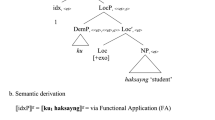Abstract
Widely attested cross-linguistically, the Negative WH (NWH)-construction involves the special use of wh-words (e.g., ‘where’, ‘what’, and ‘how’) to convey negation in certain specific contexts. The first half of this paper identifies the negative assertion as the primary meaning of the NWH construction, in addition to two conventional implicatures. In the second half, I argue that the grammatical features in NWHCs in Chinese, Korean, and Japanese strongly suggest that NWHCs should be analyzed as interrogative wh-questions. The quantification domain of NWH-words is the sets of propositions that pick out the conversational backgrounds of the sentence (Kratzer 1977; Portner 2009). The NWHC can be paraphrased as “What is the proposition q such that in view of q, p is true?” However, the interrogative question can only receive a negative rhetorical interpretation (i.e., a question without a true answer) because the conventional implicatures make it impossible for p to be true against any of the conversational backgrounds.
Similar content being viewed by others
Abbreviations
- Agr:
-
Agreement
- Dem:
-
Demonstrative
- Nom:
-
Nominative
- Q:
-
Question particle
- Sg:
-
Singular
- Cl:
-
Classifier
- Det:
-
Determiner
- Pl:
-
Plural
- Rel:
-
Relativization marker
- SP:
-
Sentence particle
- Decl:
-
Declarative marker
- Gen:
-
Genitive
- Pst:
-
Past tense
- RhetQ:
-
Rhetorical question particle
References
Caponigro, Ivano, and Jon Sprouse. 2007. Rhetorical questions as questions. In Proceedings of Sinn und Bedeutung 11, ed. E. Puig-Waldmüller, 121–133. Barcelona: Universitat Pompeu Fabra.
Cheng, Lisa. 1991. On the typology of wh-questions. PhD dissertation, MIT.
Cheung, Lawrence Y.-L. 2008. The negative wh-construction. PhD dissertation, UCLA
Choi, Jinyoung. 2005. Another type of free choice effect: Korean Amwu N-Lato. In Proceedings of the 24th West Coast Conference on Formal Linguistics, ed. John Alderete et al., 88–96. Somerville, MA: Cascadilla (Proceedings Project. www.lingref.com, document #1210).
Fiengo Robert. (2007) Asking questions: Using meaningful structures to imply ignorance. Oxford University Press, Oxford
Grice, Paul. 1975. Logic and conversation. In Syntax and semantics, Vol. 3, ed. P. Cole and J. Morgan, 41–58. New York: Academic Press.
Hamblin Charles. (1973) Questions in Montague English. Foundations of Language 10: 41–53
Han Chung-Hye. (2002) Interpreting interrogatives as rhetorical questions. Lingua 112: 201–229
Heim, Irene. 2000. Notes on interrogative semantics. MIT “Advanced Semantics” Spring 2000. http://www2.sfs.uni-tuebingen.de/~arnim10/Lehre/SS06/Wien/Heim/interrogatives.pdf
Heim Irene, Angelika Kratzer. (1998) Semantics in generative grammar. Malden MA, Blackwell
Hsieh, Miao-Ling. 2001. Form and meaning: Negation and question in Chinese. PhD dissertation, University of Southern California.
Karttunen Lauri. (1977) Syntax and semantics of questions. Linguistics and Philosophy 1: 3–44
Kratzer Angelika. (1977) What must and can must and can mean. Linguistics and Philosophy 1(3): 337–355
Lee-Goldman, Russell. 2006. Rhetorical questions and scales: Just what do you think constructions are for? Paper presented at the international conference on construction grammar 4, Tokyo University.
Oxford English Dictionary. 1989. “World,” n.16. OED Online. Oxford University Press. http://dictionary.oed.com/cgi/entry/5028720. Accessed 13 Sep 2009.
Portner Paul. (2009) Modality. Oxford University Press, Oxford
Potts Christopher. (2005) The logic of conventional implicatures. Oxford University Press, Oxford
Sadock, Jerrold M. 1971. Queclaratives. In Papers from the Seventh Regional Meeting of the Chicago Linguistic Society, 223–232. Chicago: Chicago Linguistics Society.
Sadock Jerrold M. (1974) Towards a linguistic theory of speech acts. Academic Press, New York
von Fintel, Kai. 1994. Restrictions on quantifier domains. PhD dissertation, University of Massachusetts at Amherst.
von Fintel, Kai, and Irene Heim. 2009. Lecture notes on intensional semantics. MIT Spring 2009. http://mit.edu/fintel/IntensionalSemantics.pdf
Wang, Li. 1958/1988. Hanyu Shigao [A sketch of the history of the Chinese language]. Vol. 9 of In Collection of Essays of Wang Li. Jinan: Shandong Education Publisher.
Author information
Authors and Affiliations
Corresponding author
Additional information
The author is now working at the Department of Decision Sciences, Chinese University of Hong Kong.
Rights and permissions
About this article
Cite this article
Cheung, L.YL. Negative wh-construction and its semantic properties. J East Asian Linguist 18, 297–321 (2009). https://doi.org/10.1007/s10831-009-9051-2
Received:
Accepted:
Published:
Issue Date:
DOI: https://doi.org/10.1007/s10831-009-9051-2



